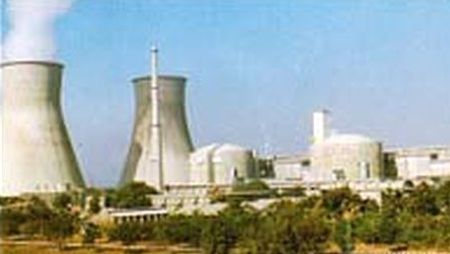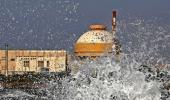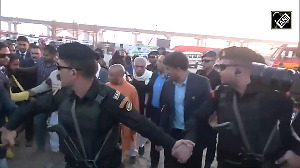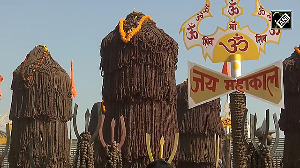
Residents of Surat, who fear for their lives after the leakage at the nuclear plant, have started an online campaign to know more about the incident.
Rashme Sehgal reports.
With the Department of Atomic Energy remaining silent on the Kakrapar nuclear plant heavy water leak, residents in and around Surat have launched an online campaign, demanding the government conduct an immediate independent investigation to find out the reasons behind the accident.
Krishnakanth Chauhan, a resident of Surat, located 80 km away from the Kakrapur nuclear plant, and one of the 300 signatories, has asked Union Minister of State Jitendra Singh in the Prime Minister's Office to explain the reasons for the accident, to inform the public how much leakage of heavy water has occurred and what emergency steps are being taken to contain the situation.
'An accident and radioactive leak would pose a serious threat to over two million people who live in Surat as well as close to a million who live within the 30 km radius of the plant. I have reasons to believe that the accident is more serious than it is made out to be and I have a right to know what is going on at the Kakrapar nuclear plant,' the letter says.
While 'the majority of us might not be experts or nuclear scientists,' the letter adds, 'we are people living in the area around this plant. We depend on experts for information and explanation and not on just empty assurances. The information that we've been asking from the operator and the regulator has not yet been disclosed.'
'We asked important questions about the radiation levels around 20 km radius of the plant, about the quantum/amount of heavy water that has leaked, about whether the leak has been identified. First we were ignored. Then we were told "it's not a safety concern." If that is true, why not simply disclose this information and put our fears to rest?' the letter further states.
The signatories have requested Minister Jitendra Singh to order an independent investigation into the Kakrapar nuclear accident and the handling of the situation. This will ensure that it is not repeated again, they say.
They informed the minister that, like the Kakrapar nuclear reactor, there are eight other reactors of similar design in India, which are also older than 20 years. Over four million people live within the 30 km radius of these reactors.
The problems the Kakrapar reactor is facing might also be possible for these reactors. And, hence, as a precautionary step, they need to be examined too. Failure to do so might put four million lives at risk.
Singh informed the Lok Sabha that the 'incident' of leakage of a coolant pipe in one of the units of the Kakrapar Atomic Power Station in Gujarat was detected 'in a few moments.'
Responding to supplementaries in the Lok Sabha during Question Hour, the minister insisted that the leakage was an 'incident,' and not an 'accident.' To keep the temperature down, alternative systems came into play when the coolant pipe leaked, he said.
On a scale of one to ten, as per the standards laid down by the international community, the minister said the incident was grade one. Such incidents, he added, have been reported in Canadian reactors, which are considered amongst the best in the world.
With nuclear energy providing around 3.3 per cent of the total electricity in the country, the government is going full steam ahead in setting up nuclear plants in Bihar, Haryana and Punjab to help meet the energy requirements.
The government is keen to increase nuclear power generation capacity three fold in the next decade.
The minister made no attempts to allay the fears of people living in and around Kakrapar Atomic Power Station. Nor did he inform the Lok Sabha about how much money is being spent to repair the damage inflicted by this accident.
Nuclear activists believe the loss has already run into hundreds of crores of rupees, but no figures are available so far.











 © 2025
© 2025